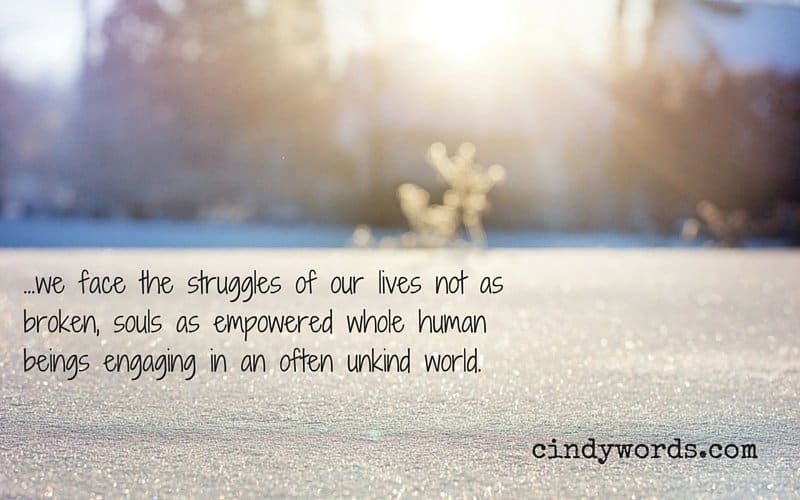
What Does Embodied Spirituality Mean to You?
April 27, 2016
One of the reasons I kissed evangelism goodbye is because of the troubling method of convincing our conversion target of their need to be saved. It’s Marketing 101, create the need then supply the solution. Both Christian establishment and global capitalism depend upon the same formula. The message we are bombarded with, both from secular and religious spheres, is that we are somehow broken, empty, and in need of something to make us whole.
Naming our deepest longing and seeking redemption is the stuff of poetry. Preaching a good news can be beautiful, healing, and transcendent. But lately I have been struggling with the language we use to frame our fundamental human condition as neediness. The metaphors we use are such that we have holes in our hearts, or that we have missing pieces of a puzzle waiting for a perfect match, or perhaps that we are incomplete and require wholeness, as if we aren’t already a whole person and only a shadow of one. I confess to having used this language myself.
“What does embodied spirituality mean to you?” This was a question asked of me at a recent podcast interview. I hadn’t considered it before and I am still working out the answer to it. But here are some initial thoughts:
Embodied spirituality critiques the idea that our spirituality is trapped in the broken vessels which are our aging bodies, temporarily residing in this world that is wasting away, waiting to be snatched up into a heavenly realm. Instead, a spirituality that is embodied means we find the fullness of our being manifested in the complex system which make up the whole of us—our bodies, our minds, our energy, our dreams, our longings, our past, present, and future.
The Christian narrative grounds our spirituality in our created-ness. That we are tenderly knit together in our mother’s womb, our cells intricately formed according to a genetic blueprint, and we emerge into this world as human beings imprinted with the image of the divine, beautiful and strong. It is good, God had declared.
One of the things that I consistently want to enforce as I work on my Unfundamentalist Parenting book is that our children are born as fully formed people, they aren’t half-beings with less-than status, but are fully capable of embodying a beautiful spirituality at two years old, five years old or fourteen years old—before a baptism, before praying the prayer, even before they utter their first word.
If this is true, and I believe it is, then we face the struggles of our lives not as broken, fragmented, empty souls in need of saving, but as empowered whole human beings engaging in an often unkind world.

We are striving, longing, laboring, but we aren’t defected goods that require fixing.
We wrestle for meaning, fight against injustice, crave love, but we aren’t insignificant until our longings are fulfilled.
We have needs, wants, desires, but we aren’t incomplete until those dreams come true.
I don’t know if this nuance is worth deliberating because that realization of our finitude feels like a hole in our hearts. I feel broken, incomplete, and insignificant. I feel weak and in desperate need of being saved.
But then I am reminded that weakness doesn’t diminish my value, in fact, my vulnerabilities often are the most resilient and precious parts of myself. So to name our human weaknesses as a problem that needs solving is to make the grave error that our weakness isn’t what makes us the most beautiful.
I think a language and theology of embodied spirituality matters to those who have disabilities, trans people, and those who suffer chronic illness. Because an overly simplistic line drawn from sinfulness to redemption imposed upon them easily becomes a theological tool for further marginalization. A body manifesting physical defects is not a demonstration of the spirituality of brokenness needing redemption. Her body struggles uniquely, but embodies a whole, dynamic, spiritual being.
This begs the question: if we are born whole and wired for struggle, then what are we saved from? I think we have to abandon the notion that redemption equals perfection and is a one time done deal. We aren’t saved into moral superiority or a balanced performance ledger. We aren’t converted once and in no more need of a Savior subsequently. My own spiritual journey tells me that I am saved by inviting a God who struggles with me in the flesh, manifested in the Jesus story as seen in Scripture, and in loving folks who care in Christ-like ways (quick disclaimer: Target boycotters not included). God doesn’t fill a hole in my heart, or fulfill my longings. God stays with me when my heart hurts and dreams with me and for me as I long for more.
Perhaps that’s not enough for some people – I know some need to worship a God who can wave a wand and supernaturally heal, shield, and perform wonders.
I just need a God who stays.

